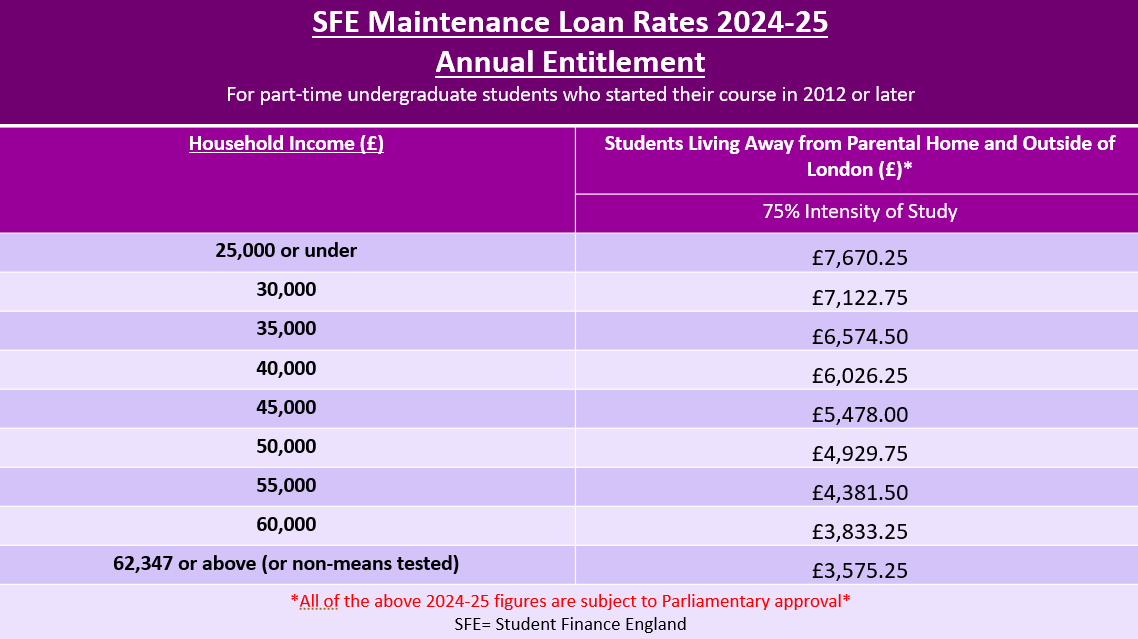Part-time BA (Hons) in Early Childhood - 2024 entry
Funding Frequently Asked Questions (FAQs):
- How much will my tuition fees be?
- What financial help is available?
- What do I do if I am paying my own fees?
- How much Maintenance Loan will I be eligible for?
- How will my Maintenance Loan affect my UK Government Means-tested benefits?
- How do I apply for the Tuition Fee and Maintenance Loans?
- How do I repay the Tuition Fee and Maintenance Loans?
- Is there any extra financial support?
- Is there any information about managing, making, and saving money?

How much will my tuition fees be?
Tuition Fees for first-year home students studying this course (BA Hons Early Childhood) in the 2024-25 academic year will be £4,620 (based on 90 CATS/ 75% full-time equivalent intensity). The University may increase fees in line with any inflationary uplift as decided by the UK Government in the second and subsequent years of your course. It is expected that such increases will be linked to the Retail Price Index (RPI excluding mortgage interest payments).
Please see the following Additional Course CostsLink opens in a new windowLink opens in a new window webpage to find out more about the costs you will incur undertaking this course that are not covered by any Tuition Fee Loan you may be eligible for. See the following link for more information about the BA (Hons) Early Childhood and BA (Hons) Early Childhood Top-UpLink opens in a new window course itself.
What financial help is available?
You may be eligible for student loans from the UK Government (Tuition Fee Loan and Maintenance Loan). Eligibility for these loans will depend on certain criteria, such as your nationality and residency status, your previous study and the number of modules you are studying. You can view the full criteria at Student Finance for Undergraduates -Eligibility.
If you are unsure whether you qualify for these student loans, you can Contact Student FinanceLink opens in a new window directly to clarify.

Tuition Fee Loan
- A non-means tested Tuition Fee Loan is available from Student Finance England (SFE).
- Eligible students will be able to apply for and take out the full amount of Tuition Fee Loan required to pay their Tuition Fees in full regardless of their household income.
- The Tuition Fee Loan is paid directly to the University to cover the cost of your fees in termly instalments.
- As it is a loan, you will need to repay it.
- You need to apply for this for every year of study.

Maintenance Loan
- Eligible students can apply to SFE for a Maintenance Loan towards their living and course costs
- The Maintenance Loan is means-tested so the amount you receive is partially based on your household income and whether you choose to live in your own home or your parental home.
- As a part-time student, the amount of maintenance loan available to you will be pro-rated to your course intensity.
- The Maintenance Loan is paid in equal termly instalments.
- As it is a loan, you will need to repay it.
- You need to apply for this for every year of study that you are eligible to receive a Maintenance Loan.
What do I do if I am paying my own fees?
You are not required to take out the Tuition Fee Loan, you can make payments for your tuition fees directly to the University. For details, visit the University's Student Finance Team's Types of Fee, Tuition FeesLink opens in a new window and Making PaymentsLink opens in a new window webpages.
How much Maintenance Loan will I be eligible for?
For the 2024-25 academic year, household income will be taken from the 2022-23 tax year and depends on the people you live with: your parent(s)/carer(s), your parent/carer and their partner or your partner.
- In certain circumstances your assessment might be based on your own income, for example, if you are aged over 25 at the start of your course.
- You don't have to provide details of your earnings from part-time work but if you have income from another source, such as investments or income from property, you will need to declare it.
- For more information on taxable income check out the GOV.UK webpage, Income Tax: Introduction.
If there has been a drop in your household income of 15% or more since the previous tax year, you should notify Student Finance England once you have applied for a maintenance loan, as you may be entitled to an increased entitlement. For more information see the following webpage, Support your Child or Partner's Student Finance Application - If your income has gone down.
To get an estimate of how much maintenance loan you could be eligible for you can use the Student Finance England CalculatorLink opens in a new windowLink opens in a new winLink opens in a new window. Please note, the calculator will ask you the number of CATS you are taking and the number of CATS a full-time equivalent student would take which is 120 CATS.
The below table demonstrates the annual Maintenance Loan figures for students studying in 2024-25. For the Part-Time BA (Hons) Early Childhood course, the intensity is currently set at 75% (90 CATS). Please note, these figures are subject to Parliamentary approval.
- The annual entitlement of Maintenance Loan is paid directly to students in equal termly instalments.
- These figures apply to students who are aged under 60 on the first day of their course and who do not qualify for government benefits.
The maximum maintenance loan amount available to final-year students is reduced, to account for the fact that you will not be registered as a student over the summer period. This means that you may receive less maintenance loan in your final year compared to your previous years of study.

How will my Maintenance Loan affect my UK Government Means-tested Benefits?
Please note, if you receive a part-time Maintenance Loan, this may have an impact on any means-tested UK Government benefits that you are entitled to. Examples of these include (list not exhaustive):
- Income Support
- Income-based Job Seekers’ Allowance
- Income-related Employment and Support Allowance
- Housing Benefit
- Council Tax Reduction
- Working Tax Credit
- Pension Credit
- Universal Credit
You are advised to contact your local Citizens Advice Centre for more information:
How do I apply for the Tuition Fee and Maintenance Loans?
Applications for part-time student loans are made online, see the Student Finance England - How to Apply webpage for more information. Applications normally open to part-time students in June and you should apply as soon as the service opens to ensure that your funding is in place for the start of your course. The application takes about 30-45 minutes and you apply for the Tuition Fee Loan and Maintenance Loan in one application.
How do I repay the Tuition Fee and Maintenance Loans?
- Repayments will begin in April after you have completed or left your course, or in April 4 years after the start of your course (whichever comes first).
- Repayments will start only when your income is over £25,000 per year (threshold from August 1 2023).
- You will repay 9p for every £1 you earn over the £25,000 threshold.
- Repayments are deducted automatically through the tax system. If you are self-employed or working overseas when your repayments are due to start, you will need to arrange separate repayment arrangements with Student Finance England.
- If your income falls below the £25,000 threshold repayments will stop automatically and not re-start until you are earning over the threshold again. If you are self-employed or working overseas while making repayments and your income falls below £25,000, you will need to contact Student Finance England directly.
- There are no early repayment penalties and you can choose to make voluntary repayments to your loan at any time.
- Any outstanding loan (including interest) is written off after 40 years or if you become permanently unfit for work or die.
- Interest is applied to your loan at the point the first payment is made to you and is linked to the Retail Prices Index (RPI).
Is there any extra financial support?
There is some additional financial support offered to eligible part-time students from Student Finance England (SFE) and the University itself.
Disabled Students' Allowance (DSA)
If you have a disability, long-term health condition, mental health condition or specific learning difficulty there is additional non-repayable support available.
- DSA is a non-repayable grant offered by SFE.
- DSA is intended to help with any disability-related costs you might have.
- Any support you receive will be based on your individual needs and the number of modules you are studying (i.e., your course intensity), not your household income.
- Part-Time students need to apply by submitting a DSA 1Link opens in a new window form.
- Make sure you apply early for DSA as applications can take up to 14 weeks as you will need to undertake a Study Needs Assessment.
- For more information on the support provided, the evidence required and how to apply check out SFE's Disabled Students' AllowanceLink opens in a new windowLink opens in a new window webpage and/ or the University's Disability Team's Applying for DSALink opens in a new window webpage. Within the University's Disability webpage, you will also find a DSA Eligibility CheckerLink opens in a new window tool which you can use to see whether you may be eligible for DSA.
Warwick Part-Time Fee Waiver (PTFW)
In 2024-25, a fee waiver of £770 per 30-credit module (pro-rata for modules of less than 30 credits) will be available to part-time degree students whose tuition fees are charged at the rate of £1,540 for a 30-credit module. Students in their first year of the Part-Time BA (Hons) Early Childhood course currently have a 75% intensity (90 CATS) and therefore eligible students can receive a PTFW of £2,310 in the 2024-25 academic year.
To be eligible you must have taken out a Tuition Fee Loan. In addition, you must be in receipt (or have a spouse or partner who is in receipt) of one or more of the UK Government Means-tested Benefits or Tax Credits listed below at the start of the 2024 academic year:
- Income Support
- Income-based Job Seekers’ Allowance
- Income-related Employment and Support Allowance
- Housing Benefit
- Council Tax Reduction
- Working Tax Credit
- Pension Credit
- Universal Credit
Applications for the Warwick PTFW will open in October 2024. The application link will be posted on the Warwick PTFWLink opens in a new window webpage. Within the Warwick PTFWLink opens in a new window webpage, you will also find further information, including the full eligibility criteria. Even if you think you will receive this PTFW and intend to take out a Tuition Fee Loan to cover the remaining balance, you should still take the full amount of the Tuition Fee Loan. If once your application is processed, you are found to be eligible for that academic year but Student Finance England has already paid the University, they will be contacted by the University to amend your Tuition Fee Loan amount and any funds required to be returned to them will be.
PTFW awards for subsequent years of your study may be adjusted in line with any increase applied to tuition fees and will depend on your continued eligibility for the scheme. You must apply for the fee waiver every year of your course.
Is there any information about managing, making, and saving money?
If you want to learn more about managing, making, and saving money, check out our Money Matters sub-section.
